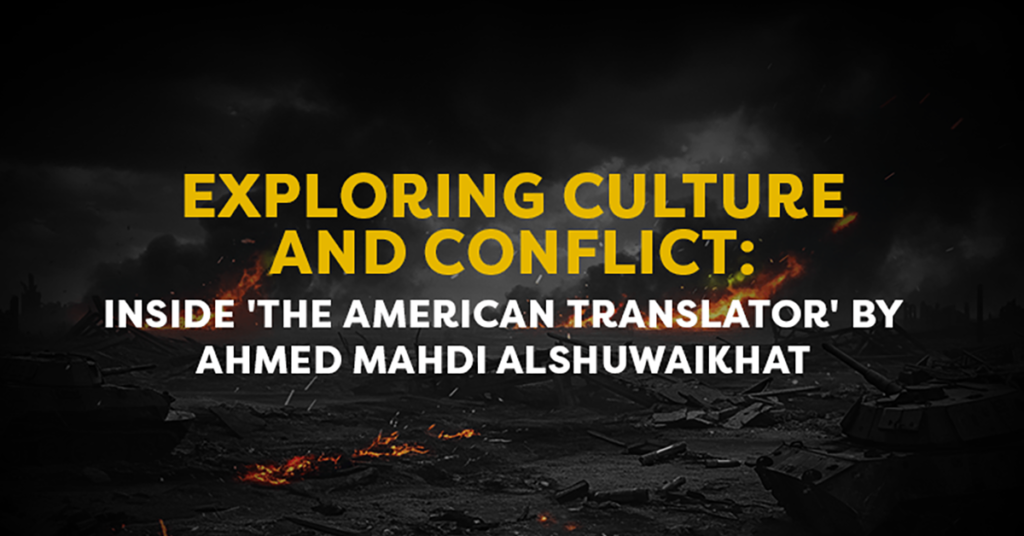In a world characterized by cultural diversity and geopolitical tension, literature has the power to transcend boundaries and foster understanding. One literary masterpiece delving into the complexities of culture and conflict is “The American Translator” by Ahmed Mahdi Alshuwaikhat. This captivating novel takes readers on a journey through the turbulent landscapes of war-torn Iraq and the vibrant streets of San Francisco. Exploring themes of identity, belonging, and the human experience in the face of adversity. Therefore, Join us as we delve into the rich tapestry of culture and conflict woven by Alshuwaikhat in this thought-provoking work of fiction.

A Multifaceted Protagonist:
At the heart of “The American Translator” is David Boccaccio, an eccentric Italian-American. Whose journey serves as a lens through which to explore the complexities of culture and conflict. Boccaccio’s dual identity as both an American and an Italian shapes his experiences and perceptions. Allowing readers to glimpse the intricacies of cultural identity in a globalized world. As he navigates the treacherous terrain of war-torn Iraq, Boccaccio is forced to confront his own preconceptions and prejudices. Ultimately leading to a deeper understanding of himself and the world around him.
The Clash of Cultures:
One of the central themes of “The American Translator” is the clash of cultures that occurs when the East meets the West in the midst of war. Alshuwaikhat expertly navigates this complex terrain, offering readers a nuanced portrayal of cultural exchange and conflict. Through Boccaccio’s interactions with Iraqi locals and American soldiers alike, readers are given insight into the challenges and opportunities. That arise when individuals from different cultural backgrounds come together in the crucible of war. However, from language barriers to ideological differences, Alshuwaikhat paints a vivid picture of the cultural complexities that shape human interaction in times of crisis.
The Human Cost of Conflict:
As Boccaccio bears witness to the devastation wrought by war in Iraq. He is confronted with the harsh realities of human suffering and loss. Through his eyes, readers are given a glimpse into the lives of ordinary people caught in the crossfire of geopolitical conflict. Therefore, From the displaced families seeking refuge in makeshift camps to the soldiers grappling with the moral implications of their actions. Alshuwaikhat captures the human cost of war with sensitivity and compassion. As readers accompany Boccaccio on his journey, they are challenged to confront their own assumptions about war, peace, and the inherent dignity of every human being.
Cultural Resilience and Hope:
Despite the pervasive sense of conflict and chaos that permeates “The American Translator” Alshuwaikhat offers glimpses of cultural resilience and hope. Through Boccaccio’s interactions with Iraqi artists, musicians, and intellectuals. Readers are reminded of the enduring power of culture to transcend the divisions of war and conflict. As Boccaccio immerses himself in the rich tapestry of Iraqi culture, he discovers moments of beauty. And connection that offers a glimmer of hope amidst the darkness of war. Through his journey, readers are reminded of the importance of empathy, and compassion. And human connection in overcoming the divisions that threaten to tear us apart.
Conclusion
In “The American Translator,” Ahmed Mahdi Alshuwaikhat has crafted a powerful meditation on the complexities of culture. And conflict in a globalized world. Through the eyes of protagonist David Boccaccio, readers are taken on a journey of self-discovery and redemption. Exploring the intricacies of cultural identity and human connection in the face of adversity. However, as Boccaccio navigates the treacherous terrain of war-torn Iraq, he learns valuable lessons about the power of empathy, and compassion. And resilience in overcoming the divisions that threaten to tear us apart. With its richly drawn characters and thought-provoking themes. Therefore, “The American Translator” is a must-read for anyone seeking a deeper understanding of the human experience in times of crisis.










